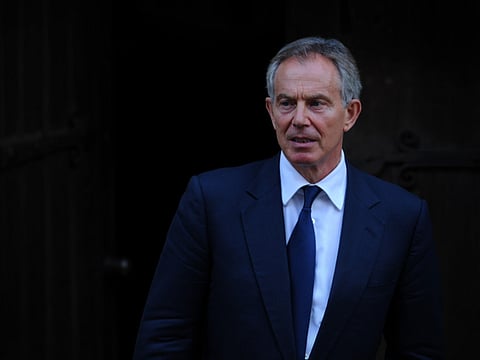Do not rule out a Blair comeback
He is, for many, thoroughly damaged goods. But if anyone can pull off a big return to politics, it’s the former Labour prime minister

In an interview with Esquire magazine, former British prime minsiter Blair said it was “an open question”. And with every day and every month that goes by, you can understand why he just might: Why a former prime minister, who has been out of British public life for almost 10 years now, might be tempted to return to the frontline of United Kingdom politics.
At the most basic level there is the chaotic state of the Labour party, of which the latest leadership election and now the shadow cabinet appointments are continuing proof. If nothing else, Blair brought the fractious party together by dint of ditching clause IV and, more importantly, winning.
Then there is the direction of Labour’s current leader Jeremy Corbyn’s party, the open rift between some of the grass roots and the parliamentary party, and the way Blair’s prized centre-ground has now been ruthlessly grabbed by British Prime Minister Theresa May. You can almost hear Blair crying out in frustration at the lack of anywhere for centrist Labourites to go. He might even be sensing the hand of history once again on his shoulder: Might he step forward to save the soul of New Labour, even at the risk of a formal split?
And the last straw was surely Brexit. Memories of Blair’s youthfully optimistic first months as prime minister have faded. But this was a time, pre-9/11, pre-Iraq, when the UK had a prime minister who believed in Europe, who dared to try out his school French in public, who spent holidays there without shame, and who contemplated the UK in the euro. In retrospect, that time can be seen as the high-water mark of UK Europeanism.
Post-referendum, no British politician has been found to speak up for the UK in Europe. Even model-European Nick Clegg has been quiet. If not me, Blair might reasonably be arguing with himself, then who?
The Europe referendum, though, exposed the former prime minister’s difficulty. In UK politics, he is, to many, damaged goods. His occupation of the centre-ground had the effect of disenfranchising old Labour. The Iraq debacle, the closeness to George W. Bush (America’s “poodle”) and the way Blair went off, post-politics, in pursuit of wealth and seemed none too fussy about where it came from, have left his credibility compromised.
Once, Blair could have been the best advocate for the UK in Europe; when the referendum came, he risked being its worst.
A change of course
And yet ... to hear or see Blair speak in public even now is to sense, almost immediately, the old magic. However sceptical you may be — and I hold him responsible for much of the popular cynicism that prevails towards politics today — you cannot fail to see that he still has what it takes to argue his case and move a crowd. His recent decision to wind up his main company to concentrate on pro bono work (oh, yes, while retaining a few private clients, but let that pass) suggested a change of course.
Blair’s career to date, however, also highlights a shortcoming of UK public life in general. When people reach the pinnacle of politics while still relatively young — Blair, and now another former prime minister David Cameron — they are likely to leave office with many potentially productive years ahead of them. Blair is still only 63.
Is money-making — brazen or discreet, selfish or altruistic — all that remains? Is there not a way in which their experience can be harnessed for the national good? For a nation with such a rich past, Britons are not at all good at using historical memory, other than by elevating their bearers to the House of Lords.
Former prime minister John Major’s combination of quiet consultancy, cricket and sparing political intervention has been about as good as it gets. Unless, that is, Blair bounces back on to the scene and shows how political comebacks are done.
— Guardian News & Media Ltd, 2016
Mary Dejevsky is a writer and broadcaster. She is a former foreign correspondent in Moscow, Paris and Washington, and a special correspondent in China and many parts of Europe.
Sign up for the Daily Briefing
Get the latest news and updates straight to your inbox


